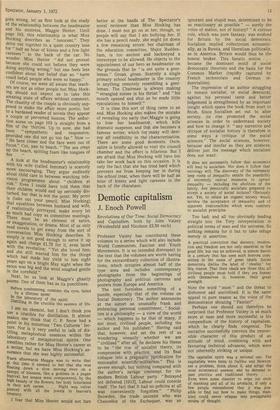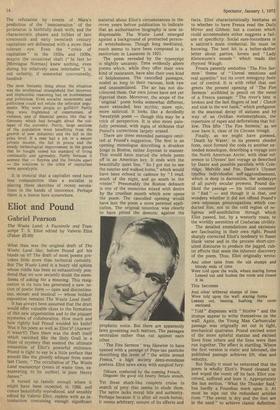Demotic capitalism
I Enoch Powell
Revolutions of Our Time: Social Democracy and Capitalism, both by John Vaizey (Weidenfeld and Nicolson £2.50 each) Professor Vaizey has contributed these volumes to a series which will also include World Communism, Fascism and Youth Movements. It is no intended disrespect to the text that the volumes are worth having for the extraordinary collection of illustrations, which occupies almost half of the type area and includes contemporary photographs from the beginnings of photography and political cartoons and posters from Europe and America. The text furnishes something of a puzzle, especially that of the volume on Social Democracy. The author announces at the outset an unusually frank and embracing personal commitment. "Socialism is a philosophy — a view of the world — which happens to be that of many, if not most, civilised people, including the author and his publisher." Having said that, however, and set the rest of us wondering uneasily whether we are " civilised " after all, he declares his theme to be " the rise of socialist theory, its compromise with practice, and its final collapse into a pragmatic justification for nationalist scientific -militarism." This is severe enough, but nothing compared with the author's savage contempt for the modern British Labour party. "Betrayed not defeated [1913], Labour could console itself. The fact that it had no policies at all was conveniently forgotten." "Philip Snowden, the trade unionist who was Chancellor of the Exchequer, was an ignorant and stupid man, determined to be as reactionary as possible" — surely the voice of malice, not of history? "A curious role, which was pure fantasy, was evolved for Britain by the social democrats. Socialism implied collectivism economically, as in Russia, and liberalism politically, as in America. Britain would thus be the honest broker. This lunatic notion . . . became the dominant motif of social democratic theorists and the basis for the Common Market (rapidly captured by French technocrats and German industrialists).
The impression of an author struggling to remain socialist, or social democrat, against his personal taste and better judgement is strengthened by an important insight which spans the book from start to finish. Since Socialism set out to alter society, its rise promoted the social sciences in order to understand society and how to change it: "any narrative and critique of socialist history is therefore in some ways a critique of the social sciences." The' social sciences, however, because and insofar as they are sciences, deliver just the message which socialism does not want:
It does not necessarily follow that economics will lead to socialism. Nor does it follow that iociology will. The discovery of the extremely Jeep roots of inequality entails the possibility pf extremely radical measures to uproot inequality — including the abolition of the Family. Are democratic socialists prepared to accept a society of social isolates? Obviously not. Yet, to retain an organic society would involve the acceptance of inequality and of apparent irrationalities which were contrary to socialist principles.
Too bad; and all too obviously leading straight into the Tory interpretation in political terms of man and the universe. So nothing remains for it but to take refuge merely in assertion:
A practical conviction that decency, moderation and freedom are not only essential to the good life, but can be achieved, is almost heroic in a century that has seen such horrors committed in the name of great ideals. Social democrats dislike the label of 'idealist' for this reason. That their ideals are those that all civilised people must hold if they are honest with themselves is, however, their great strength.
Note the word " must " and the threat to dishonest and uncivilised. It is the same appeal to pure reason as the voice of the demonstrator shouting "Fascist!" Perhaps one should not therefore be surprised that Professor Vaizey is sO much more at ease and more successful in his compendium of the history of capitalism, which he clearly finds congenial. The narrative successfully conveys the irreversible character of this product of an attitude of mind, combining with and favouring technical advances, which were not inherently striking or unique.
The capitalist spirit was a rational one. The capitalists were heirs to Galileo and Newton: see a problem, think about it, and adopt the most economical answer, and be damned to oast practice and traditional theory. . . . Even were some disaster to wipe out most of mankind and all of its artefacts, if only a few people remembered that it was possible to find out how to make things, mankind could never relapse into precapitalist modes of thought.
The refutation by events of Marx's prediction of the ' immiseration ' of the proletariat is faithfully dealt with; and the characteristic phases and foibles of late nineteenth and early twentieth century capitalism are delineated with a more than tolerant eye. Even the " crisis of capitalism " in the 1920s and 1930s, despite the occasional shaft (" In fact he [Montague Norman] knew nothing, even during his relatively sane interludes "), is not unfairly, if somewhat conveniently, handled: The most fantastic thing about the situation was the intellectual tranglehold that incorrect
and implausible reasoning had on businessmen and politicians. Even socialist economists and politicians could not refute the orthodox arguments. Why were people so gullible? Partly they were frightened of communism, of violence, and of financial panics like that in Germany which had brought about the collapse of the currency. Partly, large sections of the population were benefiting from the growth of new industries and the fall in the price level. If a man had a job or a secure private income, the fall in prices and the steady technological improvement in the goods that he bought raised his standard of living continually and agreeably. Partly because it seemed that — Keynes and the Swedes apart — the solutions to the crisis of capitalism were apocalyptic.
It is ironical that a capitalist need have less compunction than a socialist in placing these sketches of recent revolutions in the hands of innocence. Perhaps there is a lesson here somewhere.















































 Previous page
Previous page